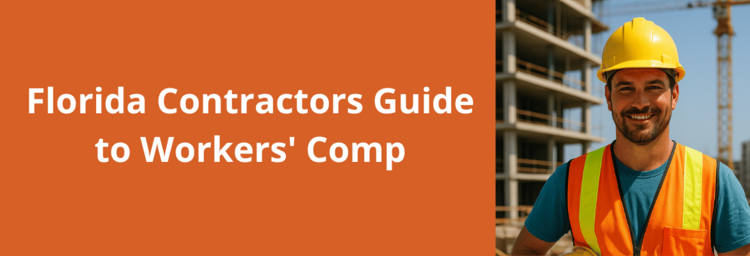
Florida Contractors Guide to Workers' Compensation: Insurance, Exemptions & Subcontractor Rules
If you're a contractor or subcontractor working in Florida’s construction industry, workers’ compensation isn’t something you can afford to ignore. Whether you’ve been on the job for decades or you're just getting started, understanding the rules around Florida construction workers’ comp is critical to protecting your business—and your bottom line.
Let’s walk through what counts as “construction,” who needs coverage, how exemptions work, and what to look out for when hiring subs.
What Counts as “Construction” in Florida?
In Florida, not all industries are treated the same when it comes to workers’ comp—and construction has its own set of strict rules.
Florida defines construction by class codes. This includes everything from general contracting to roofing, plumbing, electrical, framing, drywall, excavation, and more. If you’re unsure whether your business falls into that category, reach out—we’ll help you double-check.
📌 Bottom line: If you’re working on or near a construction site in Florida, chances are good that you’re considered a construction business and must follow those specific workers’ comp rules.
Do Florida Construction Businesses Need Workers’ Comp?
Yes—100% yes.
If your business operates in the construction industry, you’re required by law to either:
- Carry an active workers’ compensation insurance policy, or
- Have a valid workers’ comp exemption on file if you’re the owner.
If you’ve exempted yourself from coverage but hire even one employee—even part-time—you still need a workers' comp policy. No matter how short the job, everyone on a construction site must be either:
- Covered by a valid policy, or
- Have a current, approved exemption.
No exceptions.
What’s a Workers’ Comp Exemption in Florida—and Who Can Get One?
A workers’ comp exemption lets certain business owners opt out of buying coverage for themselves. But keep in mind, it also means you’re not eligible for benefits if you’re injured on the job.
In Florida’s construction industry:
- Only owners of corporations or LLCs who own at least 10% of the company are allowed to apply.
- Employees are not eligible for an exemption.
You can apply online through the Florida Division of Workers’ Compensation. It costs $50 and must be renewed every two years. Apply here.
Hiring Subcontractors? You’re Responsible for Their Coverage

Hiring subcontractors might feel like outsourcing the responsibility—but that’s not how Florida sees it.
You’re legally responsible for ensuring each subcontractor on your job has:
- Their own valid workers’ comp policy, or
- A valid exemption certificate.
If you skip this step and someone gets injured, you may be responsible for both the claim and the added premium.
⚠️ Pro tip: If your exempt sub brings a helper onto the job—like a friend or assistant—you’re responsible for them the moment they step onto your site.
How to Verify a Subcontractor’s Workers’ Comp Coverage (The Right Way)
- Ask for a Certificate of Insurance (COI) showing workers’ comp—not just general liability.
- If exempt, request their exemption certificate and make sure it is:
- Active
- Issued in the correct business name
- Not expired
Double-check every sub using these Florida state tools:
- Proof of Coverage Database: Shows active policies and exemptions.
- Construction Policy Tracking Database: Alerts you if coverage lapses or exemptions expire.
We walk you through the exact steps using Florida's online databases in our detailed guide:
👉 Florida Contractors Guide to Verifying Subcontractors’ Workers’ Comp Using the State Database
Watch Out for PEOs (Professional Employer Organizations)
Some subcontractors lease workers through PEOs. In those cases, the PEO—not the sub—is the employer. But coverage only applies to employees that the PEO has officially accepted.
If a worker isn’t registered with the PEO and gets hurt on your job? You’re on the hook.
If you must work with a sub using a PEO:
- Ask for a list of employees officially covered by the PEO’s workers’ comp policy.
- Only allow those specific workers on site.
Don’t Forget to File Your Florida Annual Report
Every Florida LLC or corporation must file its Annual Report by May 1st to stay active. If you forget, your exemption becomes invalid, and your payroll becomes subject to premium charges.
File easily at Sunbiz – Florida Division of Corporations.
Final Thoughts: Protect Your Business the Smart Way
Workers’ comp isn’t just a checkbox—it’s how Florida contractors protect their people, their projects, and their profits.
Whether you need help with:
- Getting the right workers’ comp policy
- Applying for or renewing an exemption
- Verifying subcontractor coverage
We’re here to help. Let’s talk and make sure you’re covered the right way.
📚 Related Articles
- FL Workers Comp: How to Verify Subs' Work Comp Policy or Exemptions
- All Florida Workers Comp Insurance Related Articles
💼 Get a Free Quote for Workers Compensation Insurance
Whether you need to start a new policy or review your current one, our team is here to help. Let's make sure your business stays protected and compliant.

Discussion
There are no comments yet.